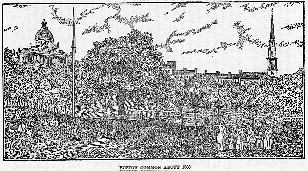degrees were conferred upon him by the universities of Cambridge, Edinburgh, and Oxford. At Oxford, the ceremonial dignity of the occasion was unexpectedly enlivened by the inquiry of a vociferous undergraduate in the gallery, "Did he come in the One-Hoss Shay?" at which, says Dr. Holmes, "there was a hearty laugh, joined in as heartily by myself."1 The volume Our Hundred Days in Europe (1887) contains the interesting record of these experiences, and is as characteristic of the author in its modesty as in its lively humor.
Over the Teacups.
The reappearance of the essayist in 1890 with a new volume, appropriately entitled Over the Teacups,
was hailed with delight by the readers who had sat with the Autocrat at breakfast a generation before.
The writer was eighty-one years old; but the old-time shrewdness of expression, the homely directness of
speech, and the mirthful spirit, always tempered by charity and good will, had not been blunted by age.
It is the Dictator, now, who presides at the table; there is an appreciative tinkling of the teaspoons, as he
discourses after the manner of past days. Who but Oliver Wendell Holmes would have linked the Salem
witches to these new-fangled cars, and sent them scudding from end to end of Essex County over the
inter-urban tracks? The Broomstick Train belongs with his best humorous poems. 
The Poet.
It is inevitable that Dr. Holmes should live in the memory of readers as the Autocrat; yet it was as a poet that he was ambitious of recognition. His best humorous narratives, The Deacon's Masterpiece, Parson Turell's Legacy, How the Old Horse Won the Bet, and The Broomstick Train, are classics of their kind. As the poet of occasions -- notably in the annual gatherings of his college class -- Holmes is without a peer. In The Boys (1859) and Bill and Joe (1868) we have the class poet at his best. His patriotic verse is not to be forgotten. The note struck in the thrilling lines of Old Ironsides is heard in the war- time poems, Union and Liberty (1861) and Voyage of the Good Ship Union (1862); and again in Grandmother's Story of Bunker-Hill Battle (1875). The strong religious feeling of the poet finds expression in a number of hymns which have a cherished place in the hearts of believers. The Hymn of Trust, A Sun-Day Hymn ("Lord of all being! throned afar"), and the Parting Hymn ("Father of Mercies, Heavenly Friend") are the most familiar. But after all, there are comparatively few of Holmes's serious compositions that reach the high standards of imaginative poetry; and of these it is The Chambered Nautilus which holds the favored place among the best-known and best-loved American poems. The later volumes of his verse were published as follows: Songs in Many Keys (1861), Humorous Poems (1865), Songs of Many Seasons (1874), The Iron Gate (1880), and Before the Curfew (1888).
"And if I should live to be
The last leaf upon the tree
In the spring,"--
The Last Leaf.
Holmes had written at twenty-two or twenty-three. Neither Whittier nor Longfellow had been heard from then. Poe's early poems, and Bryant's, of course, were being read. Lowell had not entered college. The author of The Last Leaf saw the flight of all. He paid his tribute of respect to the patriarch of American poets, on Bryant's seventieth birthday (1864), and thirteen years later wrote in happy phrase his greeting For Whittier's Seventieth Birthday. The Iron Gate marked his own arrival at the milepost of threescore and ten. It was for the Autocrat to pay loving tribute to the memory of Longfellow and of Emerson in well-known passages of At the Saturday Club (1884), and then, in 1891, to lament the death of Lowell in the most tender of all these personal poems:--
"Thou shouldst have sung the swan-song for the choir
That filled our groves with music till the day
Lit the last hill-top with its reddening fire,
And evening listened for thy lingering lay."
| Previous chapter/page | Back | Home | Email this | Search | Discuss | Bookmark | Next chapter/page |
See our FAQ for more details.